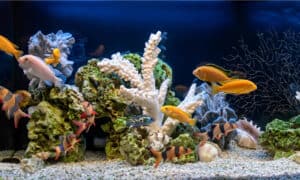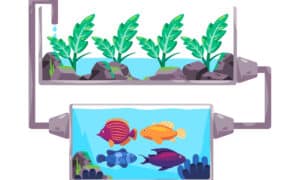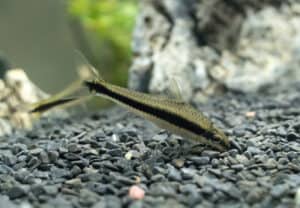| Best for | Product |
|---|---|
| Best Overall | API Leaf Zone Freshwater Aquarium Plant Fertilizer |
| Best CO2 Booster | API CO2 Booster Freshwater Aquarium Plant Care |
| Best Root Tabs | API Root Tabs Aquarium Plant Fertilizer |
| Best for Plants and Shrimp | Fluval Plant & Shrimp Stratum Plant Care |
| Best with Micro Nutrients | Fluval Plant Micro Nutrients Plant Care |
| Best for Iron | Dennerle E15 Feractiv |
| Best for Aquariums with No Fish | Dennerle NPK Booster Macro-Fertilizer |
Taking care of aquatic plants is a careful balancing act – even if you can’t see it. Aquatic plants need a careful balance of different minerals and nutrients. After all, getting that balance right is essential to their growth. Luckily, that’s where aquatic plant fertilizers come in handy.
For those that have experience taking care of aquatic plants, you’ll instantly notice that different plants need different things. Therefore, you’ll need to adjust your purchases based on what plants you currently have. For instance, red plants often need more iron to maintain their red coloration (otherwise, they often become a dull green). However, for novices (and even well-versed aquarium owners) it can be difficult to figure out which fertilizer is the best.
Below, we’ve listed different types of fertilizers that are better for certain plants. Based on this information, you should be able to select the products you need for your aquarium.
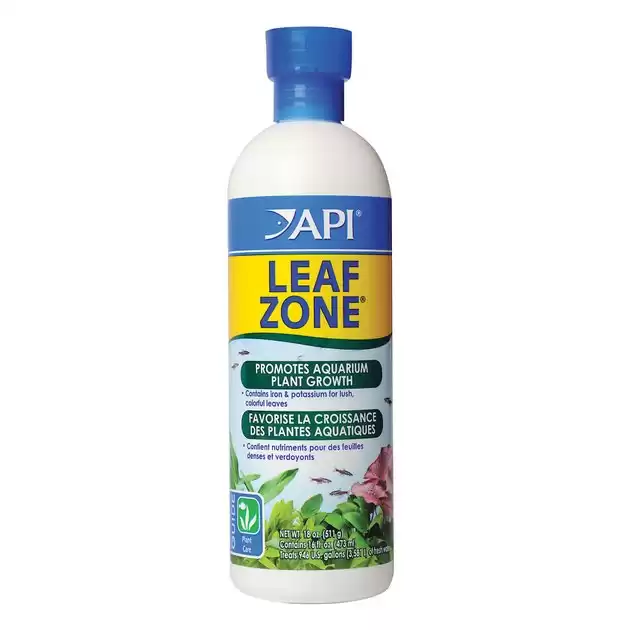 Check Chewy Check Amazon
Check Chewy Check Amazon- Generalized fertilizer
- Absorbs rapidly into plant leaves
- Easy, effective option
- Iron prevents yellowing
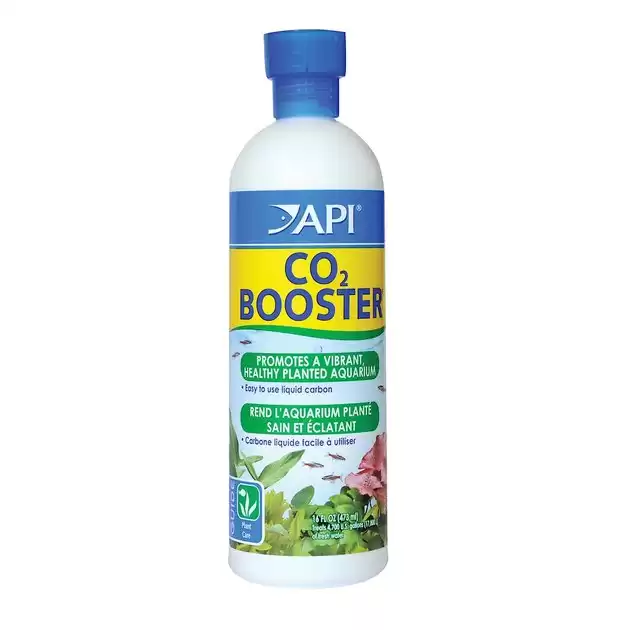 Check Chewy Check Amazon
Check Chewy Check Amazon- Aquatic plants need CO2 to thrive
- Will not alter the pH of your tank
- Safe to use with fish
- For use in freshwater aquariums
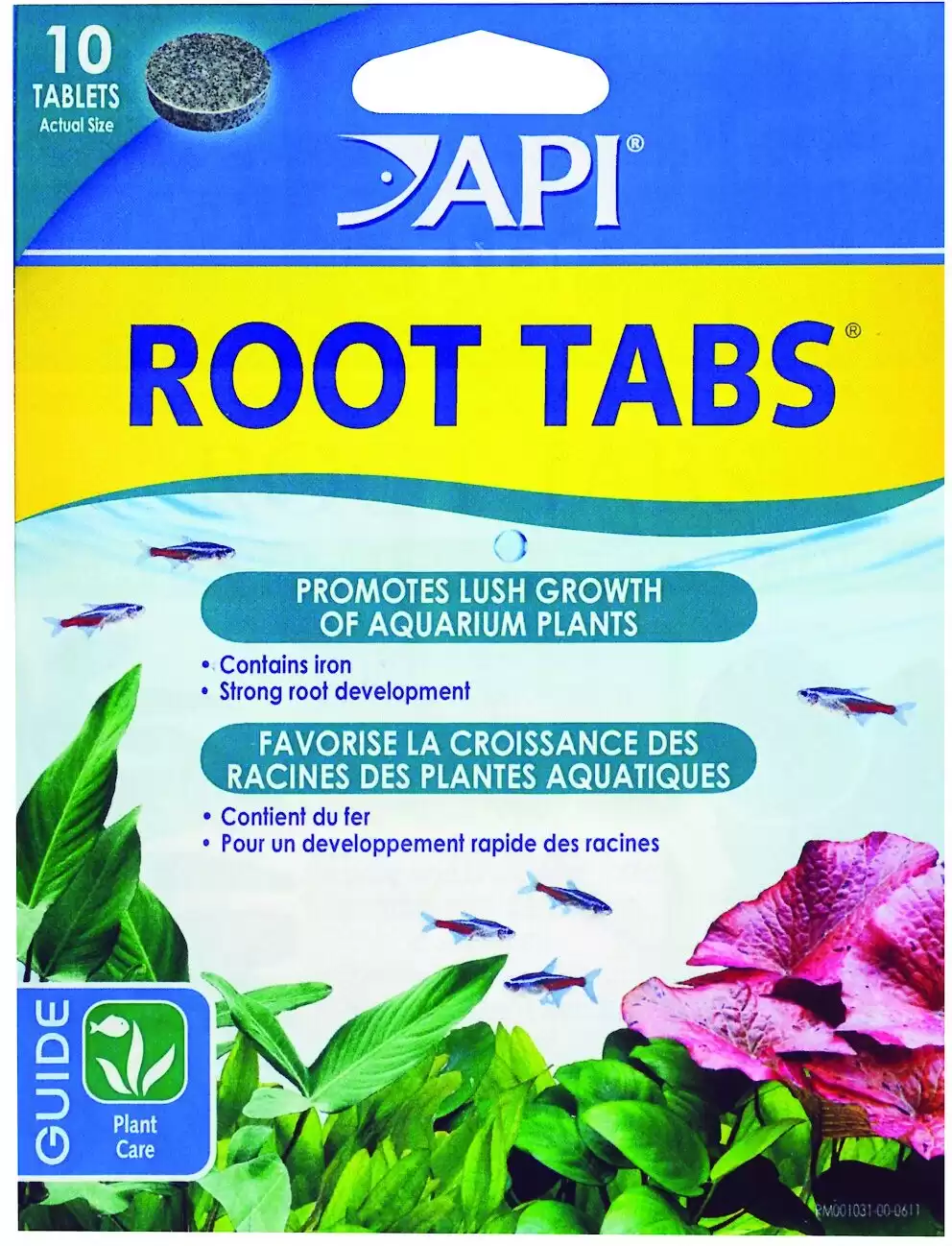 Check Chewy Check Amazon
Check Chewy Check Amazon- Very simple to use
- Add to roots about once every month
- Use this with sensitive fish who cannot stand liquid additions
- Contain iron and essential nutrients
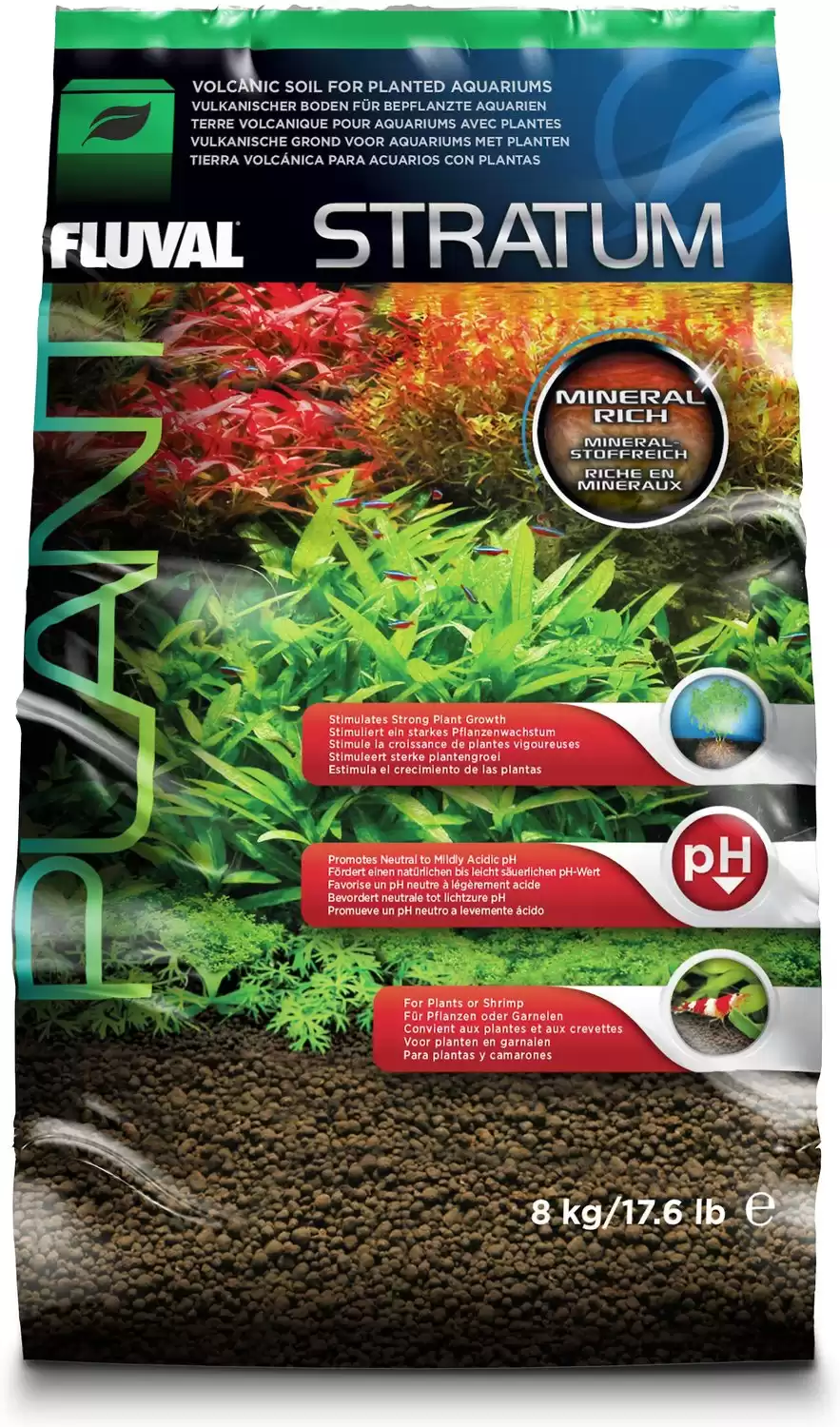 Check Chewy Check Amazon
Check Chewy Check Amazon- Perfect for plant and shrimp care
- Made with rich volcanic soil
- Promote a mildly acidic pH
- Baby shrimp blend in perfectly with the color of the substrate
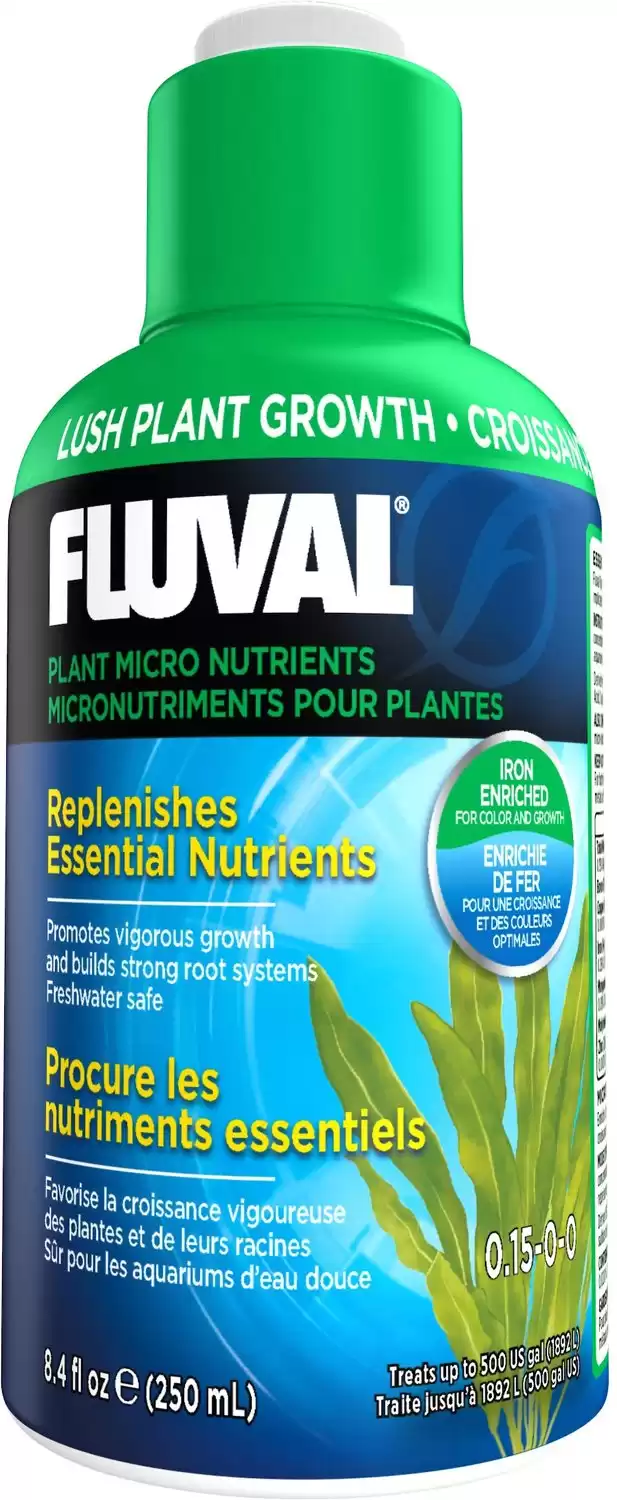 Check Chewy Check Amazon
Check Chewy Check Amazon- Micronutrient supplement
- Contains iron and vitamin B, necessary for cellular metabolism
- Especially recommended for vibrantly colored plants
- Nutrients are chelated for better absorption
 Check Amazon
Check Amazon- Add extra Iron for beautiful color
- Immediate boost plus a slower, time-release effect
- Ideal for freshwater plants
- Will promote lush, green vegetation
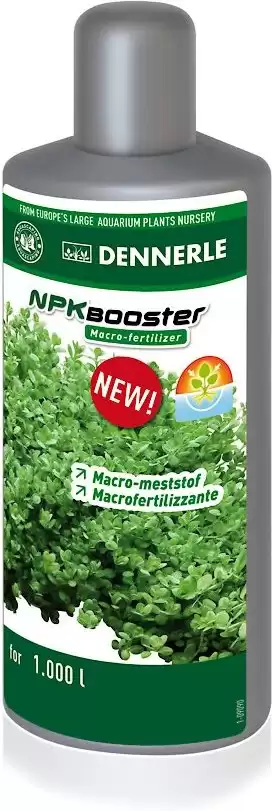 Check Chewy Check Amazon
Check Chewy Check Amazon- Recommended aquariums that have few fish
- Add nitrate, phosphate, and potassium
- Balance out excessive CO2 fertilization
- Specifically designed for fast-growing plants
Top Picks: The Best Aquatic Plant Fertilizers Today
#1. Best Overall: API Leaf Zone Freshwater Aquarium Plant Fertilizer
Our overall pick for the best aquatic plant fertilizer is the API Leaf Zone Freshwater Aquarium Plant Fertilizer. If you’re looking for a generalized fertilizer, then Leaf Zone is the one for you. It includes a general formula of everything your average aquarium plants need. Therefore, it is great for those new to the aquarium-keeping world and those that don’t feel like formulating their own fertilizing schedule.
In other words, this is an easy, effective option. It contains iron to prevent yellowing and help maintain plants’ proper color. Leaf Zone also includes potassium, which helps maintain cell pressure and promote photosynthesis. However, some more professional aquarium-keepers mentioned in reviewers that the fertilizer lacks micronutrients that can help the plants grow super quickly. Make sure to only use this formula in freshwater. You can use it in aquariums containing freshwater fish, as it is completely safe for most. It also absorbs rapidly into plant leaves.
Pros and Cons of the API Leaf Zone Freshwater Aquarium Plant Fertilizer
| Pros | Cons |
|---|---|
| It contains iron which helps plants grow and prevent yellowing leaves. | The fertilizer doesn’t contain micronutrients. |
| The fertilizer has potassium which aides plants in photosynthesis. | |
| It absorbs quickly into plant leaves. | |
| Overall great general fertilizer with what you need to maintain healthy plants. |
- Generalized fertilizer
- Absorbs rapidly into plant leaves
- Easy, effective option
- Iron prevents yellowing
2. Best CO2 Booster: API CO2 Booster Freshwater Aquarium Plant Care
For those who have aquariums that could benefit from a boost of CO2, be sure to try out the API CO2 Freshwater Aquarium Plant Care. Just like plants above the surface, aquatic plants need CO2 to thrive. Otherwise, they literally won’t be able to breathe. In most cases, the fish will release CO2 into the water and provide your plants with enough carbon components. However, if you don’t have fish in your aquarium (or don’t have enough), then your plants may benefit from some extra.
Unlike most CO2 boosters, this one will not alter the pH of your tank. Therefore, it is safe to use with most fish and plants. You can use it daily as needed. Combine it with other CO2 systems for maximum efficiency. Because CO2 is absolutely necessary for the survival of your plants, you’ll likely find yourself needing to use this supplement as well as a few others. API CO2 booster is also non-toxic for both freshwater and saltwater fish. So you won’t have to worry about snails or craw crabs being poisoned.
However, a few reviewers mentioned that they noticed their plants melting when using the CO2 booster, so definitely keep this in mind.
Pros and Cons of the API CO2 Booster Freshwater Aquarium Plant Care
| Pros | Cons |
|---|---|
| A great CO2 booster for your tank. | Some reviewers mentioned that the booster made their plants melt. |
| It will not alter the pH of your tank. | |
| It is safe to use with both freshwater and saltwater fish. | |
| Choose to use it alone or with complementary CO2 systems. |
- Aquatic plants need CO2 to thrive
- Will not alter the pH of your tank
- Safe to use with fish
- For use in freshwater aquariums
3. Best Root Tabs: API Root Tabs Aquarium Plant Fertilizer
For those looking for an easy application option, check out the API Root Tabs Aquarium Plant Fertilizer. Some plants simply do better with root tabs and they are often easier for beginners to use. You may also want to use root tabs if you have sensitive fish in your tank, since they may be unable to withstand adding liquid supplements.
Using these tabs is simple. Add tabs to the gravel about once a month. They will dissolve and be absorbed by your plant’s roots. These tabs contain iron, as well as a few other essential nutrients such as carbon and potassium. Furthermore, you can use these tabs when planting new plants or slide them underneath existing plants.
However, the only downside is that these tabs only work with plants that are attached to the gravel at the bottom of your plant’s aquarium. Plants that attach to rocks and branches cannot access the nutrients.
Pros and Cons of the API Root Tabs Aquarium Plant Fertilizer
| Pros | Cons |
|---|---|
| Perfect option for plants rooted on the bottom of the tank. | The fertilizer can only be used with plants attached to the tank’s bottom gravel. |
| This is an easy way to provide plants with fertilizer (especially for novice aquarium keepers). | |
| The fertilizer is safe to use in freshwater tanks. | |
| It contains carbon, iron, and potassium. |
- Very simple to use
- Add to roots about once every month
- Use this with sensitive fish who cannot stand liquid additions
- Contain iron and essential nutrients
4. Best for Plants and Shrimp: Fluval Plant & Shrimp Stratum Plant Care
Aquarium keepers with both plants and shrimp will love the Fluval Plant & Shrimp Stratum Plant Care. As the name suggests, this substrate is perfect for plant and shrimp care as it is one of the few aquatic plant fertilizers that keep shrimp in mind.
We recommend it for freshwater aquariums that plan on having shrimp. The organic discoloration of the substrate helps keep baby shrimp safe, as it allows them to blend in more readily. Made with rich volcanic soil that is filled with nutrients, this substrate does not discolor water. It encourages the flourishing of nitrifying bacteria, which helps promote the pH of the water. The tank will ultimately have a pH anywhere between a neutral to a mildly acidic pH. The dark color of the substrate also helps to keep the shrimp standing out in the midst of the water. However, it is a bit expensive, especially since the baby shrimp can quickly outgrow the small pores.
Pros and Cons of the Fluval Plant & Shrimp Stratum Plant Care
| Pros | Cons |
|---|---|
| This substrate is perfect for tanks that have both plants and baby shrimp. | It is a bit on the expensive side. |
| The rich volcanic soil has lots of minerals that help provide nutrients to the tank. | |
| It helps maintain a great pH for plants and shrimp. |
- Perfect for plant and shrimp care
- Made with rich volcanic soil
- Promote a mildly acidic pH
- Baby shrimp blend in perfectly with the color of the substrate
5. Best with Micro Nutrients: Fluval Plant Micro Nutrients Plant Care
If you’re looking to add micronutrients to your substrate, we highly recommend this Fluval Plant Micro Nutrients Plant Care. It provides aquatic plants with all the micronutrients they need to not only survive but thrive. Plus, it contains high levels of iron and very effective sources of vitamin B, which are necessary for cellular metabolism.
With these micronutrients, your plants are more likely to exhibit a bright color and grow strong root systems. We highly recommend this formula for those with vibrantly colored plants, as these nutrients will help those colors remain. All of the nutrients are also chelated to promote absorption. Plus, unlike similar formulas, the chelation of these minerals prevents oxidation and precipitation, which can harm your plants and fish. However, some reviews stated that they were disappointed that there were no explicit instructions on how to dose for smaller tanks.
Pros and Cons of the Fluval Plant Micro Nutrients Plant Care
| Pros | Cons |
|---|---|
| The fertilizer provides essential micronutrients to the plants. | There are no instructions on how to dose smaller tanks. |
| The formula promotes plant color vibrancy. | |
| It is enriched with vitamin B. |
- Micronutrient supplement
- Contains iron and vitamin B, necessary for cellular metabolism
- Especially recommended for vibrantly colored plants
- Nutrients are chelated for better absorption
6. Best for Iron: Dennerle E15 FerActiv
The Dennerle E15 FerActive is a fantastic addition to your aquarium if it’s lacking in iron. If you just want to add some extra iron to your aquarium, we recommend selecting this aquatic plant fertilizer. We especially recommend this fertilizer for those with red or unusually colored plants, as the iron helps them maintain their red coloration. However, it can also help green plants maintain a lush, green color.
For those with yellow or glassy plants, this extra iron may be exactly what you need. In addition, this formula provides an instant boost of iron to the aquarium, as well as a slower, time-release effect. Therefore, you don’t have to worry about continuously adding iron. There are 20 tablets in each box, which means that for the price you’re getting an ample amount of product as well. However, the tablets are not really suitable for smaller aquariums, so this is important when deciding if this is the right product for your tank.
Pros and Cons of the Dennerle E15 FerActiv
| Pros | Cons |
|---|---|
| The fertilizer replenishes iron level in your tank. | These are not meant to be used with smaller tanks. |
| The iron will ensure that all of your aquatic plants are lush in color. | |
| There is a time-release component to the tablets. |
- Add extra Iron for beautiful color
- Immediate boost plus a slower, time-release effect
- Ideal for freshwater plants
- Will promote lush, green vegetation
7. Best for Aquariums with No Fish: Dennerle NPK Booster Macro-Fertilizer
Tanks without any fish will benefit from the Dennerle NPK Booster Macro-Fertilizer. Naturally, plants and fish are designed to balance each other out in an aquarium. However, if you don’t have any fish in your aquarium (or very few fish), then you need to add some of the nutrients that the fish typically would. Luckily, that is exactly what this fertilizer is designed to do.
We highly recommend it for heavily planted aquariums that have few to no fish. This fertilizer helps fill the gaps that may be present when there is a lack of fish in an aquarium. Specifically, it is formulated with nitrate, phosphate, and potassium. All of these are balanced to support the health of most plants. However, we do recommend keeping in mind what plants you have. After all, not all plants will like this balance of nutrients. Furthermore, we found that this fertilizer helps balance out excessive CO2 fertilization. Therefore, if you’re also adding CO2, you can avoid some of the negative effects by also utilizing this formula.
Pros and Cons of the Dennerle NPK Booster Macro-Fertilizer
| Pros | Cons |
|---|---|
| This is a great fertilizer to use if you have no fish in your tank. | Some aquatic plants may not like the balance of nutrients present in this fertilizer. |
| It is formulated with nitrate, phosphate, and potassium. | |
| The fertilizer balances out excessive CO2. |
- Recommended aquariums that have few fish
- Add nitrate, phosphate, and potassium
- Balance out excessive CO2 fertilization
- Specifically designed for fast-growing plants
What to Look For in the Best Aquatic Plant Fertilizers
There are tons of different aquatic plant fertilizers out there. However, many of them only contain certain ingredients. Therefore, you have to choose the right one for your plant. Since there are so many options, however, it can be deciding the right fertilizer an almost impossible task. That’s why it’s so important to be aware of which factors to pay attention to when looking for a fertilizer that will work best for your tank.
When choosing the best aquatic plant fertilizer, you should take the following factors into consideration:
- Ingredients
- Longevity
- Price
We’ll take a look at each one of these factors in more detail below:
Ingredients
Aquatic plants need all sorts of different nutrients and minerals. Therefore, fertilizers often have a huge variety of different ingredients as well. Some of them are only iron, for instance. Others are a mix of many different nutrients, including phosphorus. There are also CO2 supplements. You need to carefully choose the best supplement for your tank, based on your plants and environment.
Longevity
Different fertilizers have different longevities. Some of them release instantly, allowing them to immediately feed the plants. Others have a delayed response. Therefore, they don’t always get absorbed by the plants. You should carefully consider which option you need for your aquarium. Often, slow-release formulas are the best options.
Price
Luckily, aquatic plant fertilizers are not terribly expensive. You can typically find them for only a few dollars. Usually, they’re around $15 to $35. Be sure to take a look at the amount you need to use for them to be effective. A larger dose will lead to the product costing more.
Up Next
- How to Choose the Right Size Fish Tank — Check out our detailed guide on how to choose the right sized tank for your fish.
- Pet Fish Guide: What You Need To Know — Check out our detailed guide to learn everything you need to know about keeping pet fish.
- The Top Aquaponics Fish Tanks — Are you looking to start an aquarium with both fish and plants? Then check out our guide to the very best aquaponic tanks!
| Best for | Product |
|---|---|
| Best Overall | API Leaf Zone Freshwater Aquarium Plant Fertilizer |
| Best CO2 Booster | API CO2 Booster Freshwater Aquarium Plant Care |
| Best Root Tabs | API Root Tabs Aquarium Plant Fertilizer |
| Best for Plants and Shrimp | Fluval Plant & Shrimp Stratum Plant Care |
| Best with Micro Nutrients | Fluval Plant Micro Nutrients Plant Care |
| Best for Iron | Dennerle E15 Feractiv |
| Best for Aquariums with No Fish | Dennerle NPK Booster Macro-Fertilizer |
The Best Aquatic Plant Fertilizers FAQs (Frequently Asked Questions)
Should I use aquarium fertilizer daily or weekly?
Technically, you can choose to do either. It all depends on the size of your aquarium. On average, most aquatic hobbyists will only spend once a week working on their tank. In general, that’s about as often as you should be applying fertilizer to your aquarium.
Is it possible to put too much fertilizer in the tank?
Yes. This is especially true for aquariums that have fewer aquatic plants. Overfertilizing can result in the pH of the tank becoming destabilized. This will then cause algae to spread more.
Thank you for reading! Have some feedback for us? Contact the AZ Animals editorial team.

